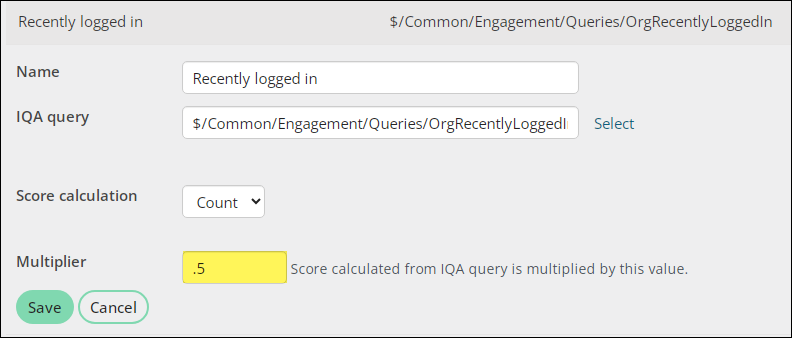Last updated on: January 27, 2026
There are several aspects to Scoring that should be understood before getting started:
- Understanding scoring terminology.
- Defining the score components.
- Determining the importance of each component.
- Calculating the score.
The following is an example of calculating an engagement score in iMIS:
Example: A membership director at an association wants to create a new engagement score formula that determines the overall engagement for each member.
Step 1: Understanding scoring terminology
Review the following terminology related to Scoring:
- Formula - Comprised of IQA queries and determines what is being measured. Out-of-the-box, there are formulas for Overall Engagement and Overall Organization Engagement.
- Score components - Components of the formula, such as the queries, score calculation, and multipliers. Whenever a score is calculated, every component defined within a formula will be included in the final calculation. These components calculate scores for each constituent of your organization by using several IQA-based elements:
- IQA Queries - Once you determine the components that will make up the "score," create a query for each individual item. For example, if you want to create a new engagement score formula for Membership Engagement, consider the member's renewal history, the number of posts in their chapter community, and the frequency of updates to their account page. To measure this, three separate queries are needed; one for each of these items that will contribute to the overall score.
- Score calculation - After the queries are created, you must determine if you will score the query using Count or Sum.
- Using Sum takes the total sum of the select Column to sum (as defined in the query).
- Using Count uses the number of rows per contact.
- Multiplier -This value is assigned to each item outlined in the formula (query). Use the multiplier to ensure that the most important aspects of the score are weighed more heavily. This way, the critical elements of the formula are given a higher rank or multiplier compared to other aspects. For example, if you are measuring membership renewals, chapter posts, and account page updates, give more importance assign a multiplier to membership renewals in the score formula rather than to account page updates.
Each of these values are weighed against the Multiplier.
- Score calculation - When scores are calculated, each constituent is also assigned a relative percentile score, which is a number from 0 to 99 that indicates their position in relation to all other constituents. For example, a relative percentile score of 75 indicates that the constituent is more engaged than 75% of all other constituents.

Note: With Scoring -Premium, you can create additional formulas to generate a score based on your defined criteria, using queries, calculations, and multipliers. For example, you could develop a score formula for Membership Engagement, considering factors like membership renewal, chapter posts, and updates to specific components on the account page. The formula represents the overall item (such as Membership Engagement) that you aim to score and measure.
Step 2: Defining the score components
To determine the member's engagement score, consider the following:
- Renewal history
- Community posts
- Volunteer attendance
- Event attendance
- Recently logged in
These are just a few possible score components. Each of the components requires a query to determine counts or sums.

Step 3: Determining the importance of each component
The number of recent logins should not be as important as a member's renewal history. To achieve this, assign each component a multiplier:
- Renewal history - 10
- Community posts - 2
- Volunteer attendance - 3
- Event attendance - 3
- Recently logged in - .5

Step 4: Calculating the score
Each score is calculated with the multiplier in mind.
The following is an example of how one member’s score would be determined based on the previous multipliers:
| Score component | Multiplier | Member's count | Score |
|---|---|---|---|
| Renewal history | 10 | 2 (member has renewed twice total) | 20 |
| Community posts | 2 | 10 (member has posted to their community 10 times) | 20 |
| Volunteer attendance | 3 | 2 (member has volunteered twice) | 6 |
| Event attendance | 3 | 1 (member has attended one event) | 3 |
| Recently logged in | .5 | 20 (member has logged in 20 times) | 10 |
| Overall Engagement Score: 59 | |||